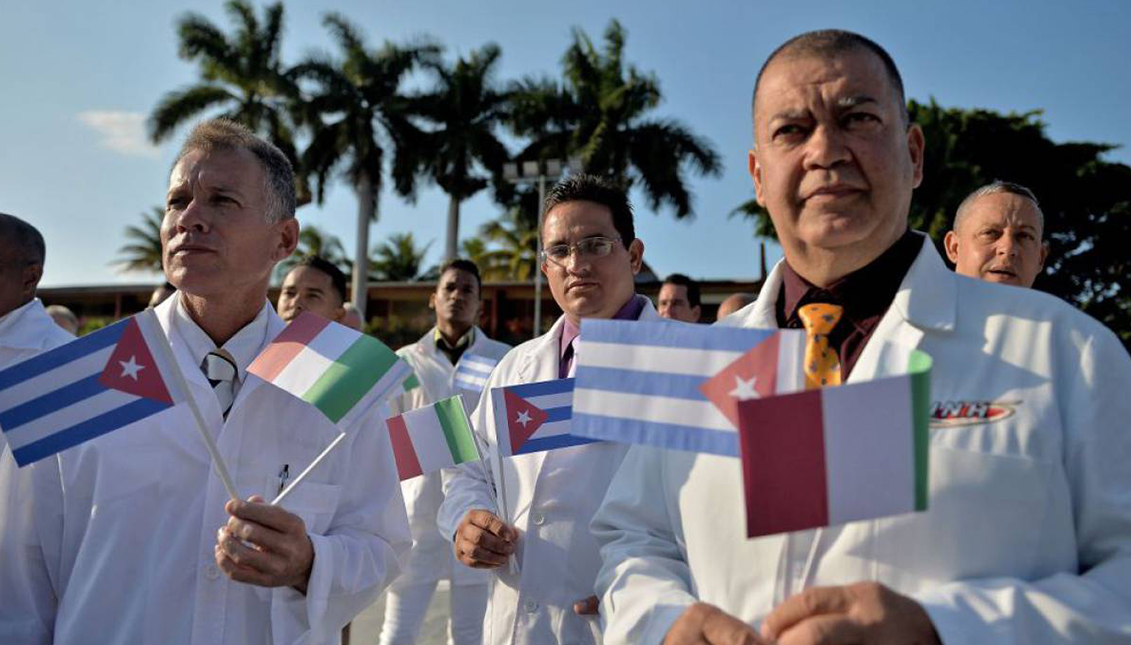
Cuba's health brigade fighting COVID-19 in Europe and Latin America
This is the first time that a "developed" country like Italy has been helped by Cuba, but it will not be the last.
When we have successfully battled the coronavirus pandemic and look back on the collective trauma, Italy will remember the Cuban doctors flying the flags of both countries when they got off the plane to help.
The memory will be particularly vivid in the region of Lombardy, where more than 90 medical professionals from Castro's so-called "white-coat army" are deployed. They're a revolutionary dream that has been saving lives in developing countries since the 1960s, but with the proliferation of the coronavirus and the overflow of health systems in the so-called first world, have also landed in Europe.
They have also done so in France's overseas territories in the Caribbean, and in the small Principality of Andorra. Cuba has also sent its powerful antiviral drug, Interferon, to Germany.
But the Cubans, despite their altruism and science, are finding it hard to get their help accepted. Spain, the epicenter of contagion in the EU along with Italy, has rejected both the drug and the appeal by 200 Cuban doctors who are begging to be allowed to work in the virus-stricken country.
With just over 11 million inhabitants, Cuba has five times more doctors than China.
Cuba's aid is something new and shocking to the old and arrogant Europe, but not to Latin America. In countries like Venezuela, there are about 30,000 doctors and nurses - the so-called "doctor aspirin" - who report some $3 billion in foreign exchange to the island.
But before we talk about business, let's talk about humanitarian aid.
On an island of just 11 million people, there are five times as many doctors per 1000 people as in China - the equivalent of 11.8 doctors per 1000 inhabitants. In addition, there are 13 medical faculties from which thousands of graduates leave each year. So many they can hardly be absorbed by the country itself.
Since the Cuban Revolution, in 1959 - and despite the exodus of up to 3,000 doctors and scientists -, Castro devoted countless efforts to make his country a pioneer in biotechnology and medicine. He intended to conquer the world not through weapons, but through humanitarianism. With a popular mantra: "science and not bombs".
Since then, Castro's health brigades have come to the aid of many countries, especially in Latin America.
Cuban epidemiologists fought Ebola in Sierra Leone and also the AIDS epidemic in Angola.
In 1960, as soon as Fidel's revolution began, hundreds of health workers were sent to Chile to help in the Valdivia region, which was hit by an earthquake. The aid was coordinated by Salvador Allende himself, who was also a doctor. They are also present in Nicaragua and Brazil starting in 2013, but the Bolsonaro regime has just kicked out the Cuban doctors from Brazil when it needed them most.
In addition to treating victims of natural disasters, such as the earthquake that occurred in Haiti in 2010, Hurricane Georges in 1998, or gross human errors -some people injured in the Chernobyl nuclear accident were treated on the island-, Cubans are specialists in epidemics.
Cuban epidemiologists went to Sierra Leone to fight Ebola and also dealt with the scourge of AIDS in Angola.
"The vast majority of Cuban missions since the 1960s have been altruistic. "They haven't charged a penny," said John Kirk, a professor at Dalhousie University and a specialist in the Cuban health model.
RELATED CONTENT
However, some question Cuba's medical philanthropy. According to data reported by La Vanguardia, the country earns between $6.5 and $8 billion in foreign currency annually for its health work.
In fact, the State Department in Washington called on the international community last Wednesday not to hire these health brigades, since they assure that the Cuban government keeps 75% of the doctor's earnings -even though the health workers abroad receive what they earn in a year in Cuba in one month of work abroad.
It seems surprising that despite the very harsh US embargo and the consequent lack of technology and patents, Cuban science is leading the fight against the coronavirus.
At least 15 countries have requested from Cuba the Alfa-2B Interferon, a powerful antiviral drug that has been one of the main tools to fight the virus in China.
The history of Cuba and interferons dates back to the 1980s, when the country began research on drugs to fight dengue fever, which gave rise to a leading biotechnology industry.
Interferon is not a vaccine against Covid-19, but it helps critical patients fight the disease.
While these antivirals have been found useful when dealing with cancerous diseases and Hepatitis B and C, one of their main missions, especially in counteracting the effects of COVID-19, is to activate the immune system so that healthy cells "kill" those infected.
Interferon Alfa-2B is not a vaccine against the coronavirus, but it helps patients avoid the critical stage of the disease and therefore prevents intensive care units in hospitals from collapsing.
The question is necessary and urgent: Does it make sense that in a global emergency situation governments like the United States or Spain continue to reject Cuban cooperation and its effective antiviral treatments?
When the hospitals cannot cope with the incessant drip of deaths, these health brigades, also called Henry Reeves brigades, could be key in the fight against COVID-19.











LEAVE A COMMENT: